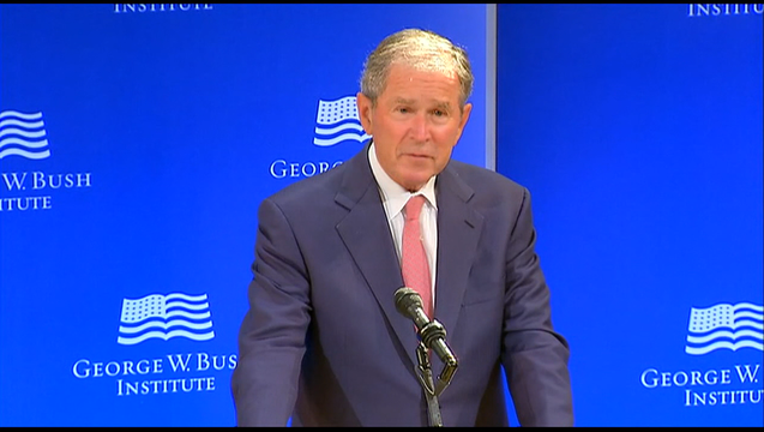George W. Bush condemns Trump-era America: 'Bigotry seems emboldened'

NEW YORK (AP) -- Former President George W. Bush on Thursday denounced bigotry in Trump-era American politics, warning that the rise of "nativism," isolationism and conspiracy theories have clouded the nation's true identity.
The comments, delivered at a New York City conference hosted by the George W. Bush Institute, amounted to an indirect critique from a former Republican president who has remained largely silent during President Donald Trump's unlikely rise to power. The 43rd president did not name Trump on Thursday, but he attacked some of the principles that define the 45th president's political brand.
"We've seen nationalism distorted into nativism, forgotten the dynamism that immigration has always brought to America," Bush said. "We see a fading confidence in the value of free markets and international trade, forgetting that conflict, instability and poverty follow in the wake of protectionism. We've seen the return of isolation sentiments, forgetting that American security is directly threatened by the chaos and despair of distant places."
"We've seen our discourse degraded by casual cruelty," he continued. "Bigotry seems emboldened. Our politics seems more vulnerable to conspiracy theories and outright fabrication."
"We need to recall and recover our own identity," he continued. "To renew our country, we only need to remember our values."
Asked about the speech, Trump said he hadn't seen it.
The comment about identity was one of several that warned of what Bush described as troubling political trends.
Bush noted Russia's meddling in the 2016 election and declared that "the Russian government has made a project of turning Americans against each other."
"Foreign aggressions, including cyberattacks, disinformation and financial influence, should never be downplayed or tolerated," Bush said.
Trump has expressed skepticism of Russia's involvement. A special prosecutor is currently investigating whether Trump and his campaign associates coordinated with Moscow in the effort to sway the election.
Bush is the brother of 2016 presidential hopeful Jeb Bush, the former Florida governor nicknamed, belittled and ultimately vanquished by Trump during the race for the Republican nomination. He joins a slowly growing list of prominent Republicans who have publicly defied Trump, including Republican Sens. John McCain, who delivered a similar speech this week. Sen. Bob Corker, the Tennessee Republican who has announced he's retiring, has denounced what he termed the "adult day care center" of the Trump White House.
But during the Bush event, a current Trump administration official also broke with Trump's dismissive tone on Russian interference. Nikki Haley, Trump's chief envoy to the United Nations, cast Russia's efforts to influence the 2016 election as "warfare" and efforts to "sow chaos" in elections across the world.
"The Russians, God bless them, they're saying, `Why are Americans anti-Russian? And why have we done the sanctions?' Well, don't interfere in our elections and we won't be anti-Russian," Haley said. She added, "When a country can come and interfere in another country's elections, that is warfare."
Facebook recently provided three congressional committees with more than 3,000 ads they had traced to a Russian internet agency and told investigators of their contents. Twitter also briefed Congress last month and handed over to Senate investigators the profile names of 201 accounts linked to Russians.

